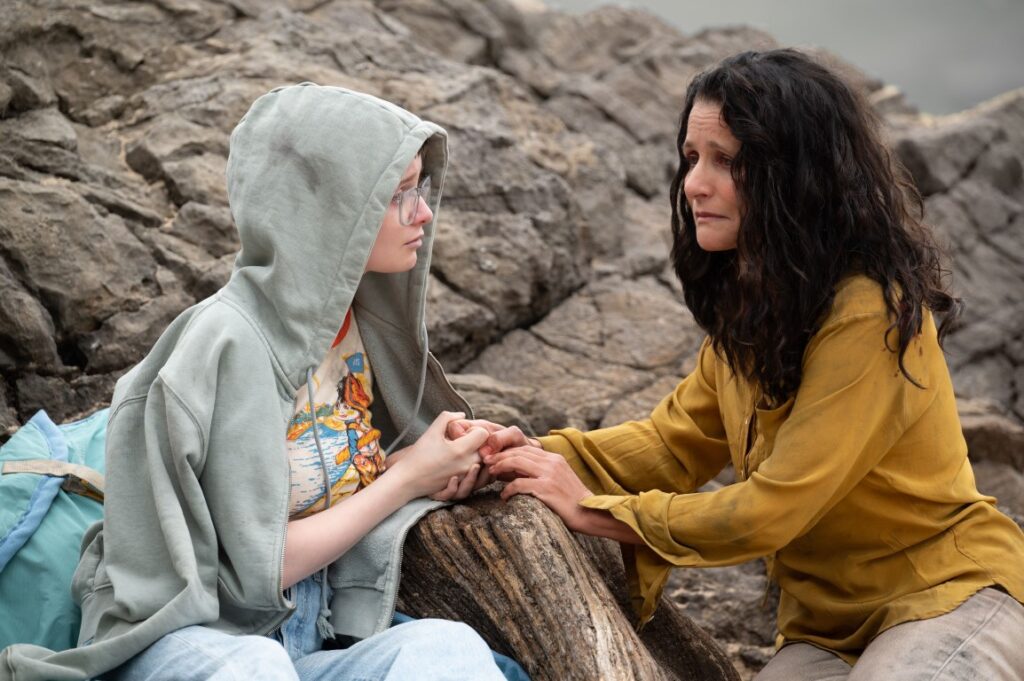Read also:
How to Watch FX Live Without CableHow To Watch AMC Without CableHow to Watch ABC Without CableHow to Watch Paramount Network Without CableFrom the cosmic ether to the granular eye, Daina Oniunas-Pusić’s singular debut feature, Tuesday, migrates across space and scale with poignant ease. Fifteen-year-old Tuesday (Lola Petticrew) is terminally ill, which her mother (Julia Louis-Dreyfus) doesn’t want to accept. It’s not until Death visits them as an elder macaw (voiced by Arinzé Kene) that Tuesday and Zora can confront the terrifying mysteries of mortality and embrace an afterlife. It’s a soaring cinematic fairy tale about life and loss that touches our heartstrings with the tenderness of a feather.
It starts with the simplicity of belief. Oniunas-Pusić’s writing feels so contemporary because it wholeheartedly embraces wonder as an axiom. This is not a late 20th-century magical comedy where half the movie is spent convincing someone (usually a parent/adult) that the magic is real. There is no dramatic irony. Instead, Pusić invites us to trust and believe in the magical reality she sets before us, just as Zora must learn to trust and believe her daughter when she says it’s time to let go. The appearance of the talking parrot sets off a chain of empathy in which everyone, including Death, wants to be understood.
It’s easy to understand these characters when the performers make everything so legible. Petticrew shows Tuesday’s conflicted feelings about being a youth at the end of her life. She’s being pulled away yet has found much to appreciate and enjoy. Tuesday could be a tragic figure, but Pusić and Petticrew render her more human than mortal. It would be easy for Petticrew to remain at Louis-Dreyfus’ feet (as Tuesday does) for most of the film, but they instead crafts a fortitude that holds its own.
And they needed to. Louis-Dreyfus’ performance as Zora is more bereft and tiptoeing than her usual characters. Zora has her struggles as a mom trying to afford her daughter’s medical care. There are many things in her life she doesn’t want to accept, like her social position and the reality of her daughter’s condition. There are flashes of Louis-Dreyfus’ incisive and wicked sense of comedic timing, but it’s couched in forlorn frustration. Zora has the biggest transformation of all the film’s characters as she transforms over the long arc of acceptance from a brittle and scared woman into one who recognizes her strength and life’s woeful beauty.

Both actresses do exceptionally well, considering they delivered most of their lines to a tennis ball or some other stand-in for the CGI macaw. As the film’s sole voice actor, Kene had the opposite disadvantage; still, he turns in a preternaturally perfect performance as a parrot who vapes, has panic attacks, and appreciates the poetry of Ice Cube. Inside his profound growl, Kene places a weariness that helps Tuesday’s connection with Death feel genuine. They bond over carrying the pain of others on top of their own. Oniunas-Pusić’s emotional insight is to have a triangle of mutual aid between Zora, Tuesday, and Death, the talking parrot.
In many ways, Tuesday follows many of the traditional motifs found in talking animal tales. It plays like a religious parable or classic fable, but with a fresh new cinematic approach. Death’s arrival as a talking bird reveals a divine natural order that must be upheld lest the world fall out of balance. Cinematographer Alexis Zabé’s magical lens grants us an ever-shifting cosmic perspective that grows and shrinks and reaches beyond a bird’s eye view.
Historically, these types of tales have not been interested in (or aware of) a character’s psychology. Yet, Oniunas-Pusić’s bold approach gives complex layers of emotion and empathy-making to the talking animal tale. As we trace the triangle of healing across our three main characters, Tuesday takes flight, spreading its wings beyond a predictable work of magical realism and into the horizon as a soaring and cathartic work of cinema.
Tuesday flies into theaters June 14th.